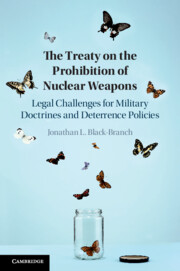 The Treaty on the Prohibition of Nuclear Weapons
The Treaty on the Prohibition of Nuclear Weapons Published online by Cambridge University Press: 17 April 2021
Although disarmament is required under Article VI of the NPT, there seems to be little movement toward this end. Indeed, a recent review of various nuclear defense doctrines in nuclear-armed states reveals the opposite, with clear evidence of nuclear renewal policies, raising questions amid mounting humanitarian pressures and developments. In an attempt to move disarmament efforts forward, the Marshall Islands raised vital questions in the International Court of Justice regarding long-standing questions on disarmament and negotiations toward a treaty to cease the arms race pursuant to Article VI of the NPT.
To save this book to your Kindle, first ensure [email protected] is added to your Approved Personal Document E-mail List under your Personal Document Settings on the Manage Your Content and Devices page of your Amazon account. Then enter the ‘name’ part of your Kindle email address below. Find out more about saving to your Kindle.
Note you can select to save to either the @free.kindle.com or @kindle.com variations. ‘@free.kindle.com’ emails are free but can only be saved to your device when it is connected to wi-fi. ‘@kindle.com’ emails can be delivered even when you are not connected to wi-fi, but note that service fees apply.
Find out more about the Kindle Personal Document Service.
To save content items to your account, please confirm that you agree to abide by our usage policies. If this is the first time you use this feature, you will be asked to authorise Cambridge Core to connect with your account. Find out more about saving content to Dropbox.
To save content items to your account, please confirm that you agree to abide by our usage policies. If this is the first time you use this feature, you will be asked to authorise Cambridge Core to connect with your account. Find out more about saving content to Google Drive.